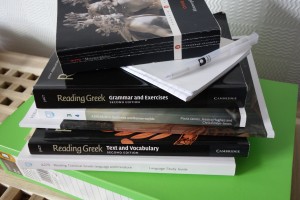by Emma Bridges
As well as working with the Classical Studies team based in Milton Keynes, I’m also one of the Open University’s Associate Lecturers. For the uninitiated, this is the name given by the OU to a veritable army of tutors who are subject experts and who deliver face-to-face teaching to students across the regions and nations served by the university. OU students tend to have a whole range of other commitments outside their studies which means that tutorials at ‘regular’ hours during weekdays aren’t ideal for most; evenings and weekends are usually more convenient for the majority. Hence, as I live in Yorkshire, I often spend my Saturdays giving tutorials in Leeds, at one of our many study centres.
 It may come as a surprise to those unfamiliar with the OU teaching/learning model that students at a ‘distance learning’ institution actually have regular opportunities to engage in person with a tutor, and with other students. The job of an Associate Lecturer involves monitoring student progress, marking assignments and offering guidance on how best to approach the module materials (some of this is also done online and over the ‘phone), as well as an element of pastoral care; but for me one of the most enjoyable aspects is getting to meet some of my students in person and to talk to them about the things in which we all share an interest. Last Saturday’s teaching involved working with two separate groups of students; the morning featured a discussion of Ovid’s Metamorphoses and its reception as part of our module Myth in the Greek and Roman Worlds and in the afternoon there was a good helping of Greek grammar along with analysis of some different translations of Aristophanes’ Clouds with students of Reading Classical Greek: Language and Literature.
It may come as a surprise to those unfamiliar with the OU teaching/learning model that students at a ‘distance learning’ institution actually have regular opportunities to engage in person with a tutor, and with other students. The job of an Associate Lecturer involves monitoring student progress, marking assignments and offering guidance on how best to approach the module materials (some of this is also done online and over the ‘phone), as well as an element of pastoral care; but for me one of the most enjoyable aspects is getting to meet some of my students in person and to talk to them about the things in which we all share an interest. Last Saturday’s teaching involved working with two separate groups of students; the morning featured a discussion of Ovid’s Metamorphoses and its reception as part of our module Myth in the Greek and Roman Worlds and in the afternoon there was a good helping of Greek grammar along with analysis of some different translations of Aristophanes’ Clouds with students of Reading Classical Greek: Language and Literature.
For me, one of the best things about teaching adult learners is the sheer diversity of experience and knowledge which students bring with them to their OU work. Many of my students have their own challenges to face – competing responsibilities at home or at work, health problems, or difficult personal circumstances. Over the years I’ve taught a whole range of people from all walks of life: those for whom caring responsibilities or health issues make part-time study the ideal way for them to pursue their own education; students who have chosen to combine their degree with work immediately post-‘A‘ levels or have done a degree elsewhere in a subject unrelated to Classical Studies (I’ve taught a fair few mathematicians and scientists whose introduction to ancient Greek has been through mathematical symbols!); some who are returning to study after a gap of sometimes decades since they were last in formal education; and still others who are studying from prison.
This rich mix of life experiences means that every student brings something different and of value to the table, and makes every tutorial a learning process for me as well as for them. At one time, for example, I had a student who was a relationship counsellor offering fresh insights into the emotional state of Euripides’ Medea; last weekend, one of my group who is also studying art history with the OU had some fascinating thoughts to share on the ways in which themes from Ovid’s poetry are depicted in the paintings we’ve been looking at; meanwhile a member of my Greek class has also studied several modern languages so is able to offer her peers some valuable advice on different elements of language learning.
I’m frequently blown away by the enthusiasm and dedication of this diverse bunch of people whom I have the privilege to teach. I’m sure that I learn at least as much as my students do from the discussions which we share; that’s just one of the many reasons why I feel lucky to be able to do this job.
As one of the many students you have helped over the years, I just want to say it was a real privilege and a joy to be taught by you! The face to face tutorials were one of my favourite parts of the Open University experience and certainly added to my motivation to take my studies on through MA to PhD level.
Thanks for the kind words, Mair!